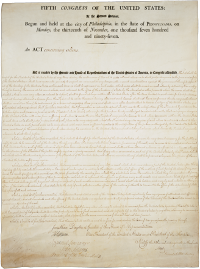The Alien and Sedition Acts
The backdrop to the passage of these laws was recently heightened tensions with France, exacerbated by an attempted bribery that was part of a larger series of diplomatic events known as the XYZ Affair. On the surface, the Alien and Sedition Acts created and promulgated by the Federalist Party-controlled Congress targeted French immigrants and Irish immigrants, the latter of whom were thought to sympathize with French interests above American interests. The letters of the Sedition Act, however, allowed the U.S. Government to target American citizens as well. The specific laws were these:
Congress passed these laws, and President John Adams (right) signed them into law, in 1798. At the time, the threat of war with France was very real. That country had strongly objected to America's signing of the Jay Treaty in The number of French immigrants in the U.S. at this time was high, numbering in the tens of thousands. The suspicion that many of these people was spying for their home country's government was high as well. But although American and French ships clashed a few times in the Caribbean, neither country declared war on the other. As a result, the government deported no one under the Alien Enemies Act. The companion law, the Alien Friends Act, had a two-year expiration notice tacked on to it; the government deported no one under this act, either. Members of the opposition Democratic-Republican Party, led by Vice-president Thomas Jefferson, strenuously objected to all four laws but particularly to the Naturalization Act and the Sedition Act. The extension of the waiting period to become a citizen for immigrants seemed to be neutral on its face; however, most immigrants at the time had political sentiments more aligned with the Democratic-Republicans than with the Federalists and so in reality, the Naturalization Act was having the net effect of delaying the growth of the Democratic-Republican Party. Next page > The Sedition Act > Page 1, 2 |
|
Social Studies for Kids
copyright 2002–2026
David White



 The Alien and Sedition Acts were a series of laws that were intended to target wartime anti-government activity but also provided the government with powerful tools to suppression opposition activity and speech.
The Alien and Sedition Acts were a series of laws that were intended to target wartime anti-government activity but also provided the government with powerful tools to suppression opposition activity and speech. 1794 because the arrangement appeared to create a favored-nation status arrangement between the U.S. and Great Britain. The French Revolution had overthrown the French monarchy and replaced it with a more representative government, known as the Directory, and the result of those actions was a series of wars between France and other European powers. Also at this time, a slave rebellion the French colony of Haiti was under way, heightening tensions in the Caribbean. Sentiment among the Federalists was generally in favor of a stronger federal government and of better relations with Great Britain, which still had a monarchy. On the other hand, the Democratic-Republicans identified more with the ideals of the French people who had overthrown their monarch.
1794 because the arrangement appeared to create a favored-nation status arrangement between the U.S. and Great Britain. The French Revolution had overthrown the French monarchy and replaced it with a more representative government, known as the Directory, and the result of those actions was a series of wars between France and other European powers. Also at this time, a slave rebellion the French colony of Haiti was under way, heightening tensions in the Caribbean. Sentiment among the Federalists was generally in favor of a stronger federal government and of better relations with Great Britain, which still had a monarchy. On the other hand, the Democratic-Republicans identified more with the ideals of the French people who had overthrown their monarch.



